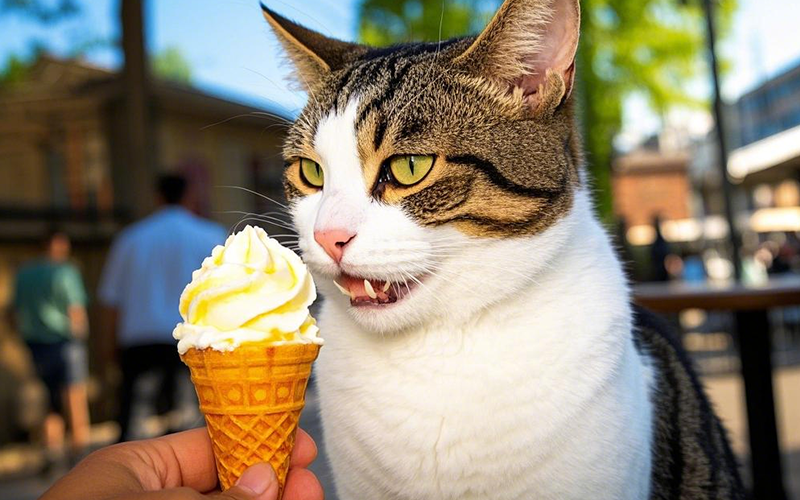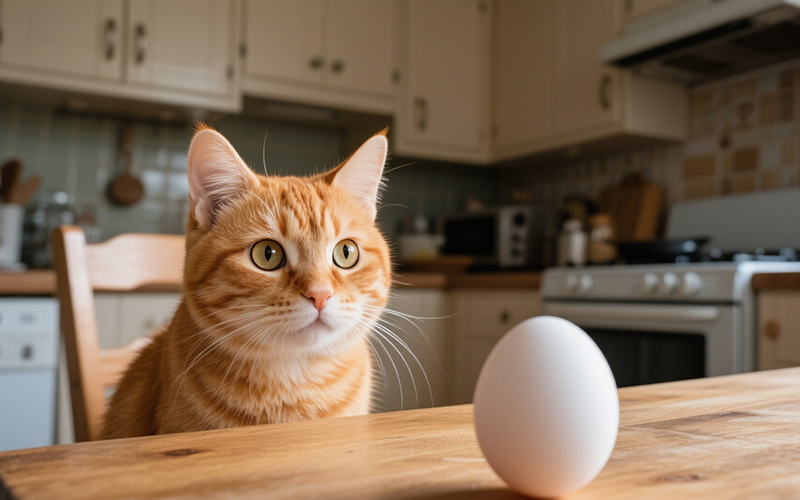Can Cats Eat Ice Cream? The Risks and Considerations of Feeding Ice Cream to Cats
- 13 Mar 2025 11:34
We all love a cold, sweet treat like ice cream on a hot day, but when it comes to our feline friends, the question arises—can cats eat ice cream? While it may be tempting to offer your cat a small bite of your dessert, it's important to understand the potential risks and effects of feeding ice cream to your cat.
Let’s explore whether it's safe for cats to consume ice cream, and what you should know before sharing this treat with your pet.

What Is Ice Cream Made Of? 🍦
Ice cream is typically made from milk, cream, sugar, and flavorings. Some varieties may also contain chocolate, nuts, or other additives. While these ingredients are safe for humans in moderation, they aren't necessarily suitable for cats.
Can Cats Eat Ice Cream? 🐱
The short answer is: No, ice cream is not recommended for cats. While ice cream isn’t inherently toxic to cats, it’s generally not good for their health, and it can lead to several issues. Here's why:
Lactose Intolerance 🐄: Many cats are lactose intolerant, meaning they cannot properly digest lactose, the sugar found in milk and cream. If a cat consumes ice cream, especially in larger quantities, it may experience stomach upset, including vomiting, diarrhea, and bloating. Even small amounts can cause discomfort for some cats.
High Sugar Content 🍬: Ice cream contains high levels of sugar, which is not suitable for cats. Cats don’t require sugar in their diet, and consuming sugary foods can lead to weight gain, diabetes, and tooth decay over time.
Dairy Products Aren’t Ideal 🧀: Although some cats may tolerate small amounts of dairy, it doesn't mean it's good for them. Dairy products like ice cream can cause digestive distress in many cats, even those who don't have full-blown lactose intolerance.
Artificial Ingredients and Additives ⚠️: Many commercial ice cream brands contain artificial flavorings, sweeteners, or even chocolate. Chocolate is toxic to cats, and ingredients like xylitol (a sugar substitute) are highly dangerous to pets. Even if the ice cream doesn't contain these ingredients, it still offers little nutritional value for your cat.
Potential Risks of Giving Ice Cream to Cats 🚨
While ice cream itself may not cause immediate harm, there are several risks associated with giving it to your cat:
Digestive Upset 💩: As mentioned, many cats are lactose intolerant, which means even a small serving of ice cream can lead to vomiting, diarrhea, or stomach cramps. Cats’ digestive systems are designed to process animal-based proteins, not dairy or sugar.
Obesity and Weight Gain ⚖️: Ice cream is high in calories, sugar, and fat, none of which are necessary in a cat’s diet. Overfeeding your cat with sugary treats can contribute to obesity and other health issues like diabetes and joint problems.
Toxic Ingredients ⚠️: Some types of ice cream may contain chocolate, coffee, or xylitol (a sugar substitute), all of which are harmful to cats. Chocolate contains theobromine, which is toxic to cats, and xylitol can lead to severe drops in blood sugar and liver failure.
Dental Problems 🦷: The sugar in ice cream can contribute to tooth decay and other dental issues, especially if given regularly. Since cats typically don't brush their teeth like humans, they rely on their food to help keep their teeth healthy.
How to Safely Give Ice Cream to Your Cat (If at All) 🍨
If you still want to treat your cat to a cold, creamy snack, there are some things to consider before offering ice cream:
Limit Portions 🍽️: If your cat shows no signs of lactose intolerance, you can offer a very small spoonful of ice cream occasionally. However, this should not be a regular treat and should be given in moderation.
Choose Lactose-Free Ice Cream 🐄❌: If you decide to share ice cream with your cat, choose lactose-free ice cream or non-dairy alternatives. However, keep in mind that even lactose-free options can still contain sugar and other unhealthy ingredients.
Avoid Toxic Ingredients ⚠️: Always check the ingredients of the ice cream. Avoid any varieties with chocolate, coffee, or xylitol, as these are toxic to cats.
Watch for Reactions 👀: After giving your cat a small amount of ice cream, observe them for any signs of digestive upset. If they seem uncomfortable or have a stomach issue, refrain from offering ice cream again.
Healthier Alternatives to Ice Cream for Cats 🥩🍗
If you want to treat your cat to something special, there are plenty of healthier and safer alternatives to ice cream:
Frozen Meat Treats 🍗: Freeze small pieces of cooked meat like chicken or turkey. This can be a safe and protein-packed treat for your cat.
Cat-Safe Frozen Treats 🍧: There are also specially made frozen treats for cats available, made with safe ingredients that will satisfy your cat’s craving for something cool without the risks associated with human ice cream.
Catnip Ice Cubes 🌿❄️: Freeze a small amount of catnip mixed with water in an ice cube tray for a cool treat that your cat will love.
Plain Yogurt 🥛: Some cats tolerate plain, unsweetened yogurt in small amounts. It can be a better alternative, though you should still be cautious if your cat is lactose intolerant.
PettureX: Your Pet’s Health Assistant 🐾💻
If you're ever unsure about what treats are safe for your cat, PettureX is a great resource. This AI-powered pet health assistant offers 24/7 consultations and can help you make informed decisions about your cat’s diet and health.
Conclusion: Can Cats Eat Ice Cream? 🍦
In conclusion, ice cream is not ideal for cats. While it's not toxic, it poses several risks, including digestive upset, weight gain, and potential exposure to harmful ingredients. It's best to avoid giving your cat ice cream and stick to healthier, more suitable treats designed for feline nutrition.
For the occasional indulgence, consider offering frozen meat treats or cat-safe frozen desserts instead. Always be mindful of your cat’s health and dietary needs when selecting treats.
Related

Can Cats Eat Egg Yolk Raw? A Vet's In-Depth Guide to Feline Nutrition & Safety
- 10 Jun 2025
Can Cats Eat Dog Kibble? Unpacking the Nutritional Mismatch!
- 29 May 2025
Can Cats Eat Deli Turkey? Slicing Through the Facts for Your Feline!
- 29 May 2025
Can Cats Eat Deer Meat? Exploring Venison for Your Feline!
- 28 May 2025
Can Cats Eat Corned Beef? Unpacking This Salty Human Delicacy!
- 28 May 2025
Can Cats Eat Cooked Rice? The Grain Truth for Your Feline Friend!
- 27 May 2025
Can Cats Eat Cornbread? A Crumb of Truth for Curious Cat Owners!
- 27 May 2025
Can Cats Eat Cooked Meat? Sizzling Facts for Your Feline's Feast!
- 26 May 2025
Can Cats Eat Chili? Spicing Up the Truth About This Human Dish!
- 26 May 2025
Can Cats Eat Chicken Eggs? Cracking the Code on This Feline Food Query!
- 24 May 2025
